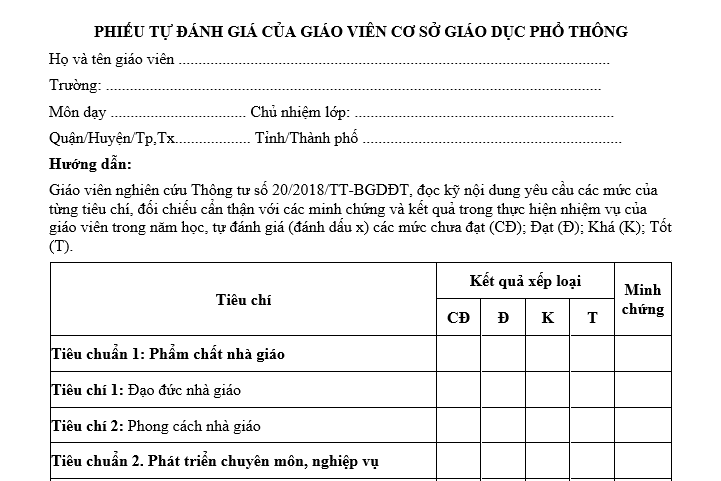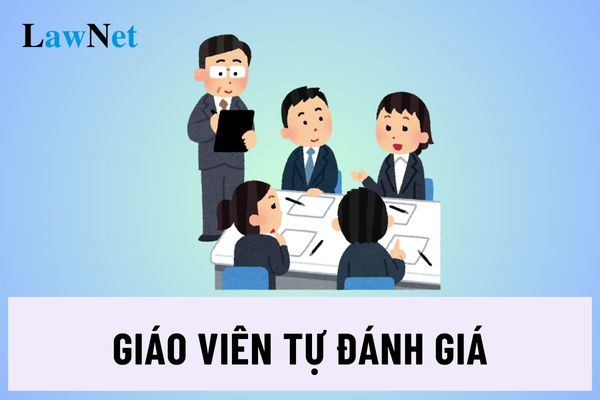Vietnam: How many times a year does a teacher conduct a self-assessment?
How many times a year do teachers at general education institutions in Vietnam conduct a self-assessment?
Under Article 11 of the regulation on professional standards for teachers of general education institutions issued with Circular 20/2018/TT-BGDDT, the time for assessment according to the professional teaching competence standards is prescribed as follows:
Frequency of assessment according to professional standards for teachers
1. The teachers shall conduct self-assessment once a year at the end of the school year.
2. The heads of general education institutions shall assess teachers every two years at the end of the school year.
3. In special cases, with the consent of the superior management agency, the school can shorten the frequency of assessment.
Teachers at general education institutions will conduct self-assessment of their professional standards once a year.
What is the self-assessment note form used by teachers in Vietnam?
UnderAppendix 2 issued with Official Dispatch 4530/BGDDT-NGCBQLGD in 2018, the self-assessment note form used by teachers at general education institutions is as follows:

>> Download the self-assessment note form used by teachers:

How many times a year do teachers at general education institutions in Vietnam conduct a self-assessment?(Image from the Internet)
What are the 15 criteria for assessment according to professional standards for teachers in Vietnam?
Under Chapter 2 of the regulation on professional standards for teachers of general education institutions issued with Circular 20/2018/TT-BGDDT with its content suspended by Clause 2, Article 1 of Circular 29/2021/TT-BGDDT, the 15 criteria for assessment of teachers according to the five groups of professional standards are as follows:
Standard 1. Quality
Comply with regulations and training on educators' ethics; sharing experiences, supporting colleagues in ethical practices and building educators' image.
- Criterion 1: Ethics
+ Qualified: Strictly comply with regulations on educators' ethics;
+ Good: Have a spirit of self-learning, self-training and strive to enhance educators' qualities;
+ Excellent: Be a model of educators' ethics; share experiences and support colleagues in ethical practices.
- Criterion 2: Image
+ Qualified: Have a demeanor and working manner suitable for a teacher in general education institutions;
+ Good: Have a sense of self-training to create a model educator's image, positively influence students;
+ Excellent: Be a model of educators' image, positively influence and support colleagues in building the educator's image.
Standard 2. Development of professional skills
Master professional knowledge and skills; regularly updating, enhancing professional competencies to meet educational reforms.
- Criterion 3: Development of personal knowledge
+ Good: Proactively research, promptly update requirements for changes in professional knowledge; creatively and appropriately apply various forms, methods and choose learning content to enhance personal professional capacities;
+ Excellent: Guide, support colleagues and share experiences regarding Development of personal knowledge to meet educational reform requirements.
- Criterion 4: Development of the plans for teaching and education towards development of qualities and capacity of students
+ Qualified: Develop plans for teaching and educational activities;
+ Good: Proactively adjust teaching and educational plans in line with the school's and local conditions;
+ Excellent: Guide and support colleagues in developing teaching and educational plans.
- Criterion 5: Using Teaching and Educational Methods Aimed at Developing Students' Qualities and Competencies
+ Qualified: Apply teaching and educational methods aimed at developing students' qualities and competencies;
+ Good: Proactively update, flexibly and effectively apply teaching and educational methods to meet reform requirements, suitable with real conditions;
+ Excellent: Guide and support colleagues in knowledge, skills and experience to apply teaching and educational methods aimed at developing students' qualities and competencies.
- Criterion 6: Inspection and evaluation towards the qualities and capacity of students
+ Qualified: Use methods to evaluate students' learning outcomes and progress;
+ Good: Proactively update, creatively apply forms, methods and tools to evaluate towards developing students' qualities and competencies;
+ Excellent: Guide and support colleagues to effectively implement evaluations of students' learning outcomes and progress.
- Criterion 7: Counseling and support for students
+ Qualified: Understand different student groups and master regulations on Counseling and support for students; integrate counseling and support activities in teaching and educational activities;
+ Good: Effectively implement measures for counseling and supporting suitable for different student groups in teaching and educational activities;
+ Excellent: Guide and support colleagues to effectively implement counseling and support activities in teaching and educational activities.
Standard 3. Development of educational environment
Develop a safe, healthy, democratic educational environment and prevent school violence.
- Criterion 8: Building of school culture
+ Qualified: Fully comply with school rules and cultural conduct codes as prescribed;
+ Good: Propose measures to effectively implement school rules and cultural conduct codes as prescribed; promptly and effectively handle violations of school rules and cultural conduct codes within the classroom and school under their responsibility (if any);
+ Excellent: Be a model and share experiences in building a healthy school culture.
- Criterion 9: Democratic rights in school
+ Qualified: Fully comply with regulations on democratic rights in school, organize students to practice democratic rights in school;
+ Good: Propose measures to promote students' democratic rights, including those of yourself, parents or guardians, and colleagues in the school; identify, reflect, prevent and promptly handle violations of students' democratic rights (if any);
+ Excellent: Guide and support colleagues in implementing and promoting democratic rights of students, yourself, parents or guardians, and colleagues.
- Criterion 10: Development and maintenance of safety, anti-bullying and anti-violence in school
+ Qualified: Fully comply with the school's regulations on safe schools and preventing school violence;
+ Good: Propose measures to build safe schools, prevent school violence; promptly identify, reflect, prevent, and handle violations of safe school regulations and prevention of school violence (if any);
+ Excellent: Be an exemplary model in the development and maintenance of safety, anti-bullying and anti-violence in school; share experiences in building and implementing safe schools and preventing school violence.
Standard 4. Development of family-school-community partnerships
Participate in organizing and implementing activities to develop relationships between school, family, and society in teaching, moral education and lifestyle education for students.
- Criterion 11: Development of cooperation with students' parents or guardians and relevant parties
+ Qualified: Fully comply with current regulations concerning parents or students' guardians and related parties;
+ Good: Establish healthy, trusting relationships with parents or students' guardians and related parties;
+ Excellent: Propose measures to the school to strengthen cooperation with parents or students' guardians and related parties.
- Criterion 12: Family-school-community partnerships in education for students
+ Qualified: Provide complete and prompt information on students' learning and training in class; information about the curriculum and learning plans for parents or students' guardians and related parties; receive information from parents or students' guardians and related parties about students' learning and training;
+ Good: Proactively cooperate with colleagues, parents or students' guardians, and related parties in implementing measures to guide, support, and motivate students in learning, implementing the curriculum and learning plans;
+ Excellent: Promptly address feedback from parents or students' guardians and related parties about students' learning and training and implementing the curriculum and learning plans.
- Criterion 13: Family-school-community partnerships in education about ethics and lifestyle for students
+ Qualified: Participate in organizing, providing information on school rules and cultural conduct codes for parents or students' guardians and related parties; receive information from parents or students' guardians and related parties on students' morals and lifestyle;
+ Good: Proactively cooperate with colleagues, parents or students' guardians, and related parties in moral and lifestyle education for students;
+ Excellent: Promptly address feedback from parents or students' guardians and related parties on moral and lifestyle education for students.
Standard 5. Use of foreign languages or ethnic languages, application of information technology, operation and use of technological equipment for teaching and education.
Use foreign languages or ethnic languages, apply information technology, and exploit and use technological devices in teaching and education.
- Criterion 14: Use of foreign languages or ethnic languages
+ Qualified: Be able to use basic communication words in a foreign language (preferably English) or a second foreign language (for teachers teaching foreign languages) or an ethnic language for positions that require the use of ethnic languages;
+ Good: Be able to exchange information on simple, familiar everyday topics or simple, familiar topics related to teaching and education activities (preferably English) or a second foreign language (for teachers teaching foreign languages) or an ethnic language for positions that require the use of ethnic languages;
+ Excellent: Be able to write and present simple paragraphs on familiar topics in teaching and education activities (preferably English) or a second foreign language (for teachers teaching foreign languages) or an ethnic language for positions that require the use of ethnic languages.
- Criterion 15: Application of information technology, operation and use of technological equipment for teaching and education.
+ Qualified: Use basic application software and technological devices in teaching, education, and student management as regulated; complete training and refresher courses on exploiting and applying information technology and technological devices in teaching and education as regulated;
+ Good: Apply information technology and digital learning resources in teaching and education activities; update and effectively use software; exploit and use technological devices in teaching and education activities;
+ Excellent: Guide and support colleagues to enhance their capability in applying information technology; exploit and use technological devices in teaching and education activities.

